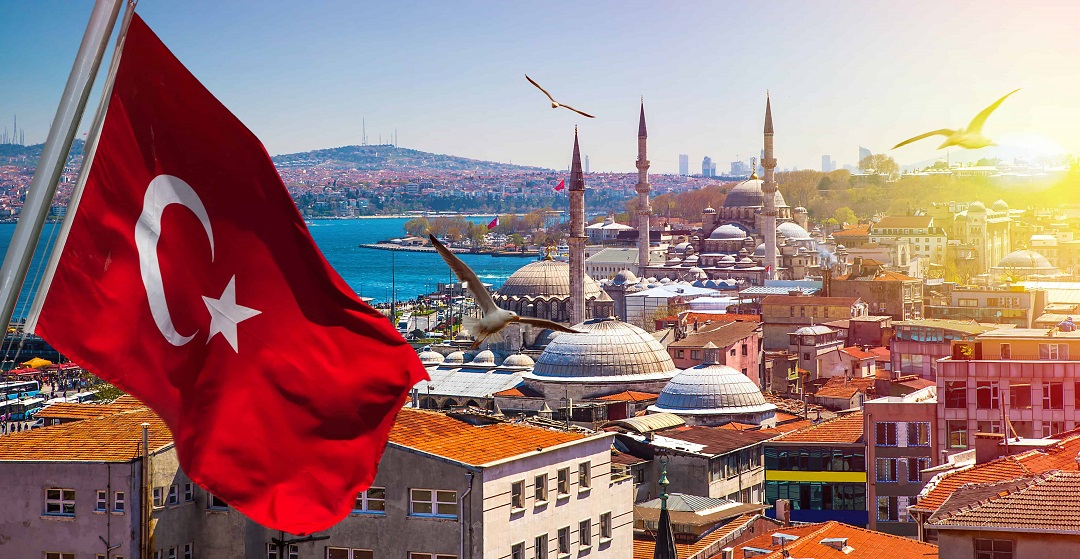 In this article, we mainly introduce the basic situation of the Turkish market. Including: geographic location, major cities, population status, ethnicity, major festivals, natural resources, major industries, GDP, foreign exchange reserves, employment status, prices, corporate income tax, personal tax rates, etc.
In this article, we mainly introduce the basic situation of the Turkish market. Including: geographic location, major cities, population status, ethnicity, major festivals, natural resources, major industries, GDP, foreign exchange reserves, employment status, prices, corporate income tax, personal tax rates, etc.
Introduction
The Republic of Turkey (Turkish: Türkiye Cumhuriyeti; English: The Republic of Turkey), referred to as Turkey, is a country spanning Europe and Asia. It borders the Black Sea to the north, the Mediterranean Sea to the south, Syria and Iraq to the southeast, and the Aegean Sea to the west. It borders Greece and Bulgaria, and to the east it borders Georgia, Armenia, Azerbaijan and Iran. Turkey's geographical location and geopolitical strategic significance are extremely important, and it is the crossroads connecting Europe and Asia.
Turkey spans two continents, Asia and Europe, and implements the European model in politics, economy, and culture. It is a candidate for the European Union. The Constitution stipulates that Turkey is a country with democracy, separation of church and state, and a legal system. Turkey’s diplomacy focuses on the West, and it strengthens relations with European countries while maintaining its traditional strategic partnership with the United States. Turkey is a member of NATO and a founding member of the Organization for Economic Cooperation and Development and a member of the G20. With a strong industrial foundation, it is one of the world’s emerging economies and one of the fastest growing countries in the world.
Capital
Ankara, the capital and second largest city of Turkey, the capital of Ankara Province, is the political, economic, cultural, transportation and trade center of Turkey, located in the northwestern part of the Anatolian Plateau on the Asia Minor Peninsula.
Ankara is the second largest industrial center in the country after Istanbul. There are east-west railway lines that lead to major cities and ports in the country, and many roads lead to all sides. The airport maintains air links at home and abroad. It has been a traffic fortress since ancient times and is known as the "heart of Turkey".
Main City
Istanbul
Istanbul is not only the largest city in Turkey, but also the economic, cultural and historical center of the country. There are a large number of historical sites, a strong cultural atmosphere, and attractive food and entertainment facilities. With a population of approximately 14.4 million, it is the largest city in the Middle East and the sixth largest in the world.
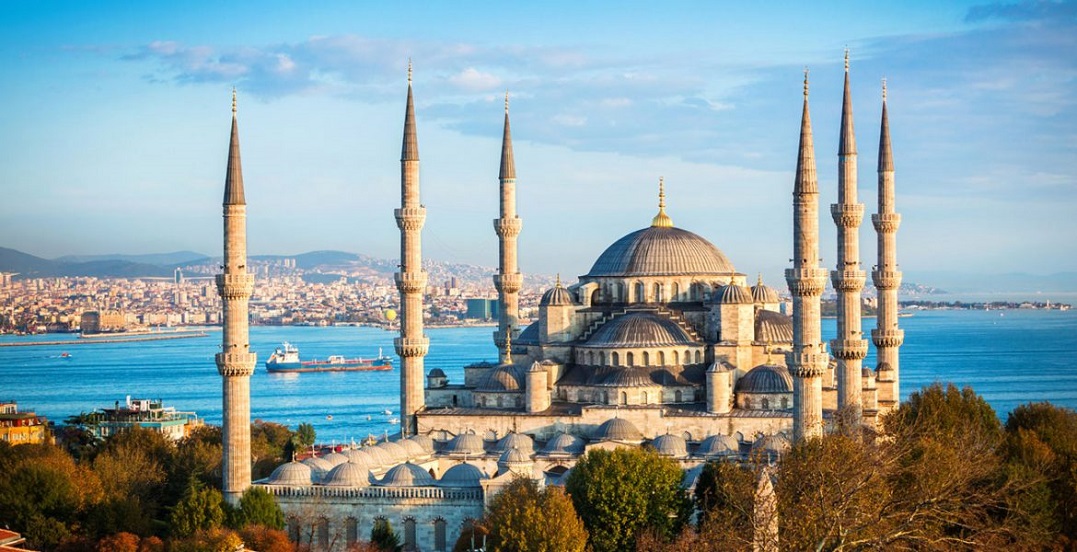 Istanbul - Photo | Google
Ankara
Istanbul - Photo | Google
Ankara
Ankara is the second largest city in Turkey with a population of approximately 5 million. Ankara is also the capital of the country. It is the headquarters of government and diplomatic agencies. It is also a university city with a large student population.
 Ankara - Photo | Google
Izmir
Ankara - Photo | Google
Izmir
Izmir is a cosmopolitan city on the coast of the Aegean Sea, the third largest city in Turkey, and the second most important port. There are luxury hotels and sports facilities, and entertainment, shopping and business centers are also very developed, so it attracts a large number of tourists from all over the world, and has a good world tolerance.
Bursa
Bursa was once the first capital of the Ottoman Empire. It is currently the fourth largest city in the country and the capital of Bursa Province. There are hot springs and ski trails in the city. The population is approximately 1.96 million.
Adana
Adana is the fifth largest city in Turkey and is now the capital of Adana Province. This city is the transportation hub to Syria and Iraq, and nearby is the Ingillik Air Force Base established by the United States. The site was built as early as the Hittite era and has always been one of the agricultural centers of Asia Minor.
Gaziantep
Gaziantep is one of the oldest cities in the world, with a history dating back to 4000 BC. The metropolitan area of Gaziantep includes the entire Gaziantep Province, with a population of 1.3 million, making it the sixth largest city in Turkey.
Konya
This inland city is the home of ascetic monks, and when the Sufi Festival (sufi) is held every year, a large number of tourists visit Konya, making the city alive. Konya has a population of approximately 1.22 million and is the seventh largest city in Turkey.
Antalya
Antalya is the largest city in the Mediterranean Sea and is known as the Turkish Riviera. With more than 300 days of sunshine, beaches, sunshine and comfortable resort hotels, it is one of the most popular tourist destinations in the world. The 2015 G20 Leaders Summit was held here. The city's total population is approximately 965,000.
 Antalya - Photo | Google
Diyarbakir
Antalya - Photo | Google
Diyarbakir
Diyarbakir is the largest city in southeastern Turkey. It is the capital of Diyarbakir Province with a total population of about 600,000. Diyarbakir is famous for its delicious watermelon and exports a large amount of watermelon. The local watermelon festival is held every year, which is the most important event.
Mersin
Mersin is a city under the jurisdiction of Mersin Province. It is located in southern Turkey with an area of 1,772 square kilometers and an altitude of 100 meters. The population is approximately 860,000.
Jet Lag
In Turkey, the local normal time is 6 hours behind Beijing time. After subtracting 6 hours from Beijing time, it is the local normal time in Turkey.
Turkish Summer Time: From the last Sunday in March to the last Sunday in October each year. Daylight saving time is one hour more than normal time.
Population and Ethnicity
83 million (December 2019), Turkish people accounted for more than 80%, and Kurdish people accounted for about 15%.
Language
The official language is Turkish.
Main Holiday
New Year's Day: January 1st
National Sovereignty Day: April 23rd
Sun Yat-sen Day: May 19th
Victory Day: August 30th
Republic Day (Independence Day): October 29th
Eid al-Fitr: October 1st (Islamic calendar)
Gurban Festival: December 10th (Islamic calendar)
 Natural Resources
Natural Resources
Turkey is rich in mineral resources. Mainly include boron, chromium, iron, copper, bauxite and coal. The reserves of boron trioxide and chromium ore rank among the top in the world. The forest area is vast, Lake Van is rich in fish and salt, and the Anatolian plateau has vast pastures. Hydropower resources are also abundant. Dams and reservoirs are built on the canyons of major rivers to develop hydropower and irrigation.
Turkey has oil and natural gas production, but the production is not enough to be self-sufficient and must be imported from abroad. The discovery of oil fields in the Iskenderun Gulf of East Thrace on the Black Sea coast of North Anatolia and the South Anatolia region near the borders of Syria and Iraq is expected to increase the self-sufficiency rate.
Main Industry
Turkey’s economy is dominated by services, industry and agriculture. Their total GDP in Turkey is 63.9%, 1.8%, and 14.3% respectively.
Industry
The industrial foundation is good, mainly including food processing, textile, automobile, mining, steel, petroleum, construction, wood and paper industries. The main industrial sectors include steel, cement, mechanical and electrical products, and automobiles.
Manufacturing uses about one-tenth of the labor force, accounting for one-fifth of GDP. Despite low productivity, because cotton is grown locally and workers’ wages are low, the textile industry (including yarn, fabrics, and carpets) was still a rapidly growing industry in the 1970s and 1980s, despite low productivity. The petrochemical industry developed rapidly in the early 1980s. Turkey has become a major steel producer in the Middle East. The construction machinery industry is also developing rapidly.
Turkey has a large and continuously growing automobile industry. In 2006, it produced 1,024,987 cars, ranking seventh in Europe, after Germany (5,819,614), France (3,174,260), Spain (2,770,435), and the United Kingdom (1,648,388) ), Russia (1,508,358 vehicles) and Italy (1,211,594 vehicles). In 2008, Turkey produced 1,147,110 cars, surpassing Italy to become the 6th largest car manufacturer in Europe and 15th in the world.
Turkish brands Beko and Vestel are Europe's largest manufacturers of home electronics and appliances.
Vestel Electronics is the largest TV manufacturer in Europe, accounting for 21% of the European market in 2007. In January 2005, Vestel and its rival Turkish electronics and household appliances (white goods, refers to refrigerators, washing machines, etc.) brand BEKO accounted for more than half of the European market. Another electronic brand, Profilo-Telra, was the third largest in Europe in 2005 TV manufacturer. The market share of Turkish manufacturers has increased with the signing of tariff agreements between Turkey and the European Union. From 1995 to 2005, the TV market share increased from 5% to 50%, digital products from 3% to 15%, and white products from 3% to 18%.
Agriculture
The agricultural foundation is good. The main agricultural products are tobacco, cotton, rice, olives, sugar beets, oranges, and livestock. Main agricultural and sideline products such as grain, cotton, fruit, vegetable and meat are basically self-sufficient, with a grain self-sufficiency rate of 98.8%. In recent years, the degree of agricultural mechanization has increased and the area of mechanical farming has continued to expand. The wood processing industry is developed. The forest area is 220,000 square kilometers.
Tourism
Tourism is one of the important sources of foreign exchange income. In 2019, the total number of foreign tourists reached 51.86 million, with tourism revenue of 34.5 billion U.S. dollars. The main tourist cities are: Istanbul, Izmir, Antalya, Bursa, etc. The ruins of ancient cities such as Troy and Ephesus, Cappadocia and Pamukkale are the main scenic spots.

Turkish General Food - Photo | Google
Out of the economic crisis, recovery is blocked again
According to Turkish officials, Turkey has emerged from the economic crisis in 2019. The main evidence is that in the second half of the year, Turkey’s economic growth rate changed from negative to positive in each quarter. In the first quarter of 2019, Turkey’s GDP actually fell by 2.3% year-on-year, and in the second quarter it fell by 1.6%.
By the fourth quarter of 2019, the actual growth rate of the Turkish economy has increased significantly to 6.0%-the same as the actual growth rate of the Chinese economy in the fourth quarter, surpassing other developing countries such as India and Indonesia. From this perspective, the Turkish economy has indeed emerged from the previous economic crisis.
According to the calculation of the prices of goods and services in Turkey in 2019, Turkey's GDP is 4,280.381 billion lire, equivalent to 753.7 billion U.S. dollars, and the annual growth rate is 0.9%. With a population of approximately 82.6 million, Turkey’s per capita GDP in 2019 is approximately US$9,100-roughly equivalent to 90% of China’s per capita in the same period.
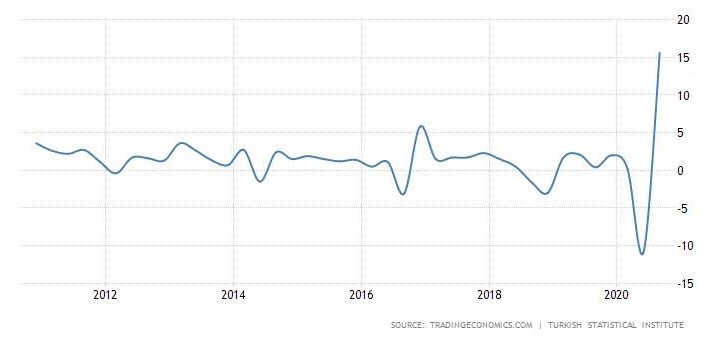 Turkey's GDP growth rate trend chart over the years | TRADING ECONOMICS
Turkey's GDP growth rate trend chart over the years | TRADING ECONOMICS
However, it is a pity that Turkey will encounter the new crown pneumonia epidemic in 2020. According to the forecast of the IMF, the Turkish economy may experience a negative growth of 5% in 2020, breaking the recovery momentum since the second half of 2019.
Foreign exchange reserves continue to fall and will be exhausted
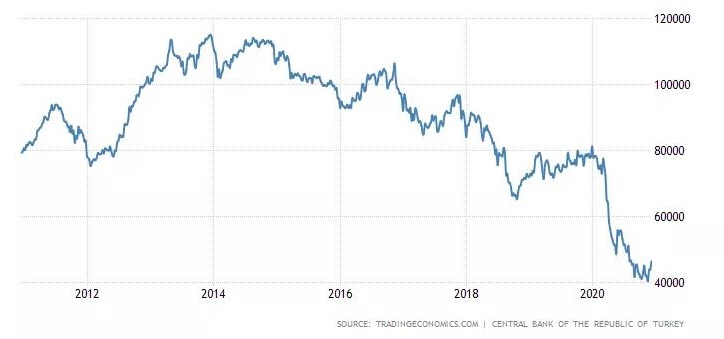 Turkey's foreign exchange reserves trends over the years | TRADING ECONOMICS
Turkey's foreign exchange reserves trends over the years | TRADING ECONOMICS
According to Cristian Maggio, Head of Emerging Markets Strategy at TD Securities, as of April 22, the Turkish Central Bank may only have net reserves of 1.4 billion U.S. dollars. This estimate has been deducted from the swap size. The daily increase of 1.8 billion U.S. dollars to 25.6 billion U.S. dollars, this further shows that the Turkish central bank may have exhausted its net reserves since the beginning of this week.
Due to the drastic reduction in international economic activities under the epidemic, it is now a special situation. Once Turkey's foreign exchange reserves are exhausted, or a more serious chain reaction is triggered, not only the country's currency exchange rate is easily manipulated, but also because of the lack of international payment capabilities, it will be unable to continue to engage in import and export trade.
The unemployment rate continues to hover at a high level
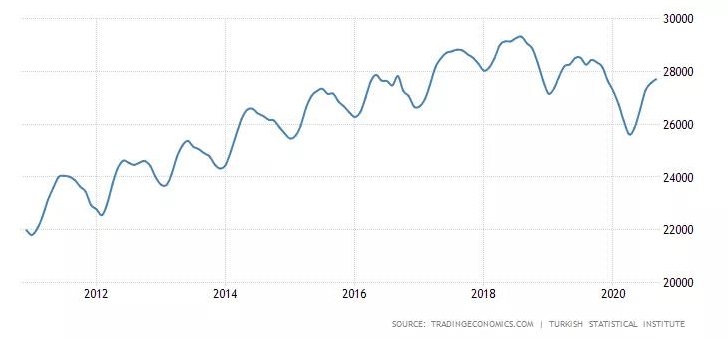 Turkey's employment population trends over the years | TRADING ECONOMICS
Turkey's employment population trends over the years | TRADING ECONOMICS
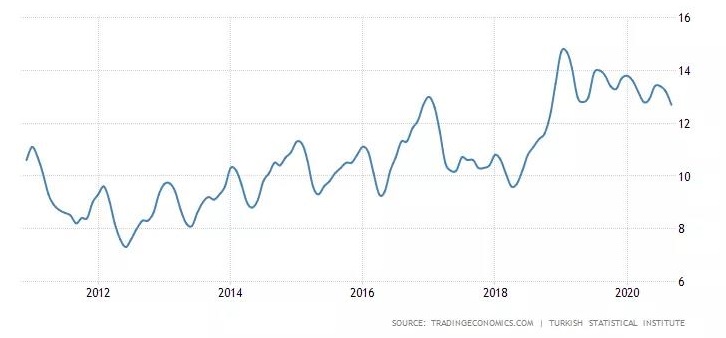 Unemployment rate trend chart in Turkey over the years | TRADING ECONOMICS
Unemployment rate trend chart in Turkey over the years | TRADING ECONOMICS
The unemployment rate in Turkey has remained high, and the epidemic that has lasted for several months has made the unemployment problem even worse. The unemployment rate in Turkey reached 13.4% in June.
According to the data at the end of 2019, there are nearly 1.2 million unemployed people in Istanbul, but as of April this year, the number of unemployed has exceeded 2 million. The occupations most affected by the epidemic are chefs, restaurant waiters, drivers, teachers in training institutions, sales assistants, hairdressers, and tourism employees.
Prices have risen linearly and inflation has risen
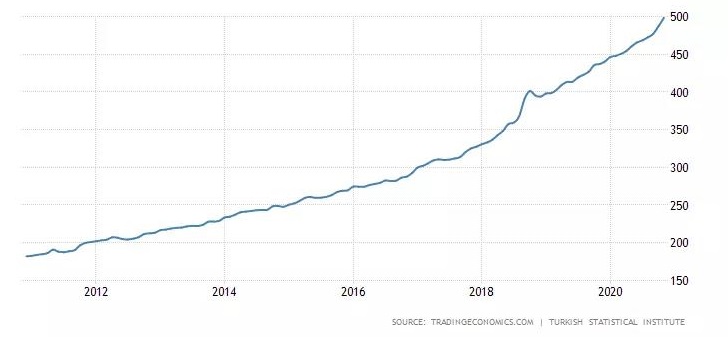 Turkey Consumer Price Index CPI Trends over the Years | TRADING ECONOMICS
Turkey Consumer Price Index CPI Trends over the Years | TRADING ECONOMICS
From 2011 to 2020, the Turkish consumer price index CPI continued to rise and prices rose.
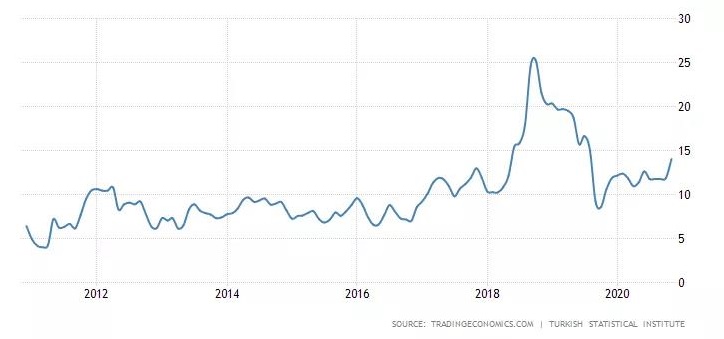 Turkey's inflation rate trend chart over the years | TRADING ECONOMICS
Turkey's inflation rate trend chart over the years | TRADING ECONOMICS
From 2011 to 2020, Turkey's inflation rate fluctuated significantly, and it soared in 2018 and 2019, indicating that the economic growth rate has accelerated.
Corporate income tax rate 22%
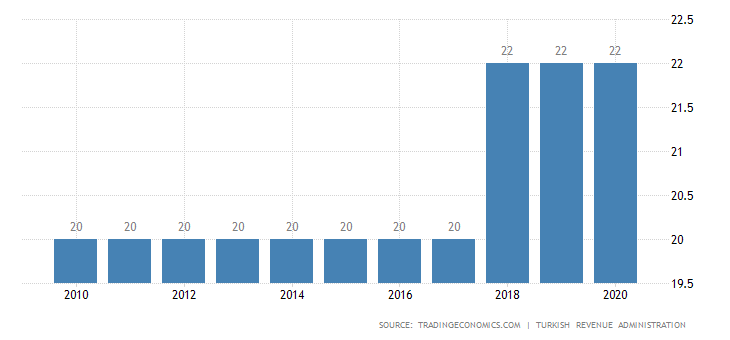 Turkish corporate income tax trends over the years | TRADING ECONOMICS
Turkish corporate income tax trends over the years | TRADING ECONOMICS
In 2020, the Turkish corporate income tax rate is 22%.
Personal income tax rate 35%

Turkey's personal income tax trends over the years | TRADING ECONOMICS
In 2020, Turkey's personal income tax rate is 35%.
www.bozhou-int.com











 Turkey's inflation rate trend chart over the years | TRADING ECONOMICS
Turkey's inflation rate trend chart over the years | TRADING ECONOMICS

 International Copper Prices Rise
International Copper Prices Rise
 China's Import and Export Data
China's Import and Export Data
 Latest Progress of China-Europe Freight Trains
Latest Progress of China-Europe Freight Trains